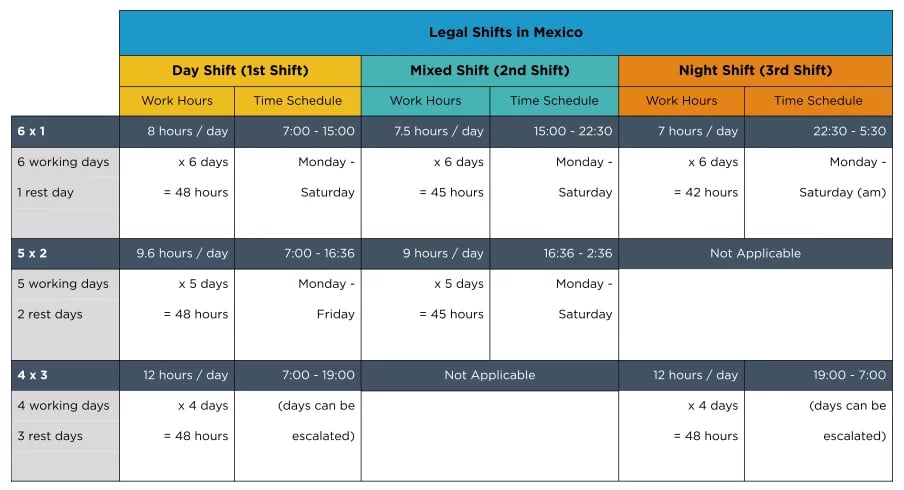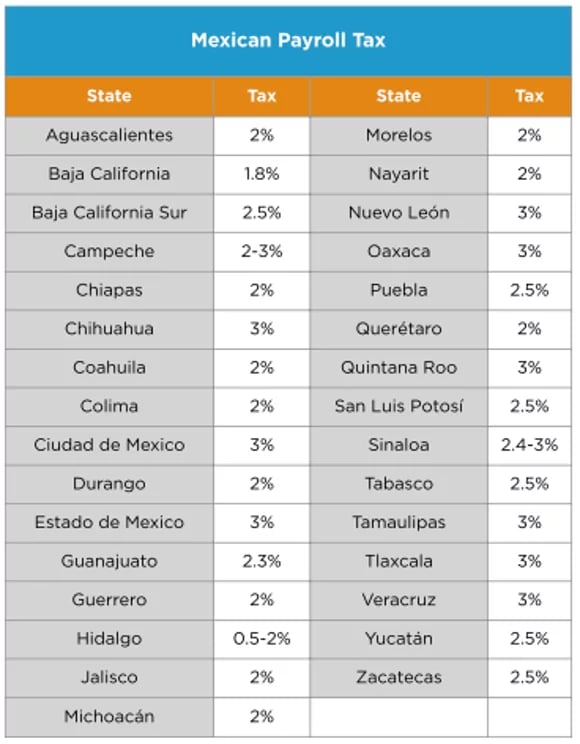The Prodensa E-Book “Mexico's Employment Law” provides actionable insights to the Human Resources non-specialist during their market research and investigation stage into the Mexican labor market. Some of the most notable changes to federal labor law in Mexico have occurred since 2019, accompanied by ongoing changes to the socio-political climate. This creates the need for continual compliance support from experts dedicated to the navigation of operations in Mexico.
Find below an overview of the full “How to Hire Employees in Mexico” E-Book, as well as a link to receive more insights from the Prodensa labor experts.
Work Week, Shifts & Overtime
The legal workweek in Mexico consists of 48 hours of work. These hours are usually divided over 6 labor days, 8 hours each. Each day of the week is paid, whether the employee works or not. At least 1 rest day is given per week.
The Day Shift consists of 48 total hours worked per week. The Mixed Shift consists of 45 total hours worked per week. The Night Shift consists of 42 total hours worked per week. The chart below shows different shift fashions according to legal working shifts, common in the manufacturing industry in Mexico.

Overtime calculations are found in the chart below. They range from 100% additional benefits for the first 9 hours of overtime work in a week up to a 200% premium for hours beyond as well as multiple occasions in a workweek.

Holidays
The Mexican Federal Labor Law establishes 9 mandatory holidays:

If employees are required to work on mandatory holidays, they are entitled to a 200% premium in addition to their regular payment.
Additional holidays may be given according to individual company policy. These usually reflect cultural or religious observances by region in Mexico. Other company policies not mandated by law include time off for marriage or a family death, cultural or social gatherings.
The Mexican culture is very celebrated and social. Planning and observing additional holidays or events improves employee retention and productivity.
Employment Labor Agreements
There are two main types of employment contracts for employees in Mexico: indefinite contracts or definite contracts.
Indefinite contracts are characterized by stability without an end date for employment. The contract continues as long as both parties uphold their bargains.

On the other hand, definite or temporary contracts are defined for a specific period of labor. They are agreed upon when required by the nature of the work provided. This may also encompass trial periods for employment.
The termination of an indefinite contract requires an employer-paid severance, including:
- 3-month salary.
- Seniority premium, 12 days of salary for each year of service (capped at two times the daily minimum wage), for employees with more than 15 of seniority.
- Seniority severance, if applicable, 20 days of the employee’s salary for each year of service.
- Due benefits and other payments reimbursement.

Labor Reform 2019
The Mexican Labor Reform published on the first of May 2019 is considered to be the most profound change to Mexico´s labor legislation in recent dates. This is because it transforms the labor justice system. It shifts the power from the executive branch to the judiciary branch. It creates labor conciliation centers to attend disputes and lawsuits.
The second more relevant change is related to the freedom of association and collective bargaining. This marks a new stage in both trade union life and the dynamics through which collective working conditions are carried out in Mexico.
Read the full Labor Reform blog.
Payroll Costs
Salary employees in Mexico are usually paid every 14 or 15 days. In most industries, hourly employees are paid weekly. Payroll tax is calculated depending on the Mexican state.

The minimum salary is set annually and becomes effective on January 1st of each year. Very few industries actually pay the minimum wage rate. Benefits are an important aspect of an employee compensation plan and range from an additional 28% to 100% premium packages, considering fringe benefits. There are minimum mandatory benefits, including Christmas bonus, vacation days & premium, paid holidays, and employer-paid profit-sharing.
All employees on payroll are enrolled in Social Security, a strong social welfare system. It provides basic yet complete medical care, home loans, childcare, disability insurance, and retirement benefits.
In many industries, employee turnover can commonly reach 10% per month. Understanding the factors and practices that promote employee retention can create peace of mind for your Mexico venture.







